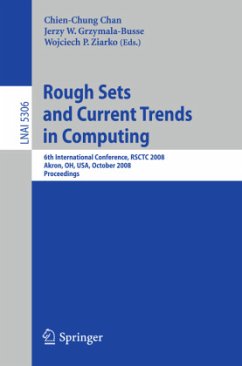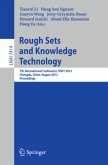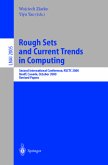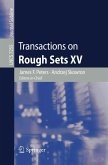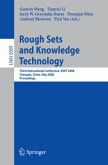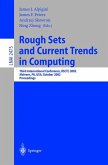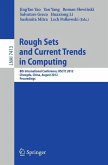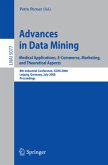This book constitutes the refereed proceedings of the 6th International Conference on Rough Sets and Current Trends in Computing, RSCTC 2008, held in Akron, OH, USA, in October 2008.
The 49 revised full papers presented together with 2 keynote papers and 3 special session papers were carefully reviewed and selected from numerous submissions. The papers are organized in topical sections on logical and mathematical foundations, data analysis, data mining, decision support systems, clustering, pattern recognition and image processing, as well as bioinformatics. The three special session papers cover topics such as rough sets in data warehousing, classification challenges in email archiving, and approximation theories: granular computing vs. rough sets.
The articles in this volume were selected for presentation at the Sixth Inter- tional Conference on Rough Sets and Current Trends in Computing (RSCTC 2008), which took place on October 23-25 in Akron, Ohio, USA. The conference is a premier event for researchersand industrial professionals interested in the theory and applications of rough sets and related methodo- gies. Since its introduction over 25 years ago by Zdzislaw Pawlak, the theory of rough sets has grown internationally and matured, leading to novel applications and theoretical works in areas such as data mining and knowledge discovery, machine learning, neural nets, granular and soft computing, Web intelligence, pattern recognition and control. The proceedings of the conferences in this - ries, as well as in Rough Sets and Knowledge Technology (RSKT), and the Rough Sets, Fuzzy Sets, Data Mining and Granular Computing (RSFDGrC) series report a variety of innovative applications of rough set theory and of its extensions.Since its inception, the mathematical rough set theory was closely connected to application ?elds of computer science and to other areas, such as medicine, which provided additional motivation for its further development and tested its real-life value. Consequently, rough set conferences emphasize the - teractionsandinterconnectionswith relatedresearchareas,providingforumsfor exchanging ideas and mutual learning. The latter aspect is particularly imp- tant since the development of rough set-related applications usually requires a combination of often diverse expertise in rough sets and an application ?eld.
The 49 revised full papers presented together with 2 keynote papers and 3 special session papers were carefully reviewed and selected from numerous submissions. The papers are organized in topical sections on logical and mathematical foundations, data analysis, data mining, decision support systems, clustering, pattern recognition and image processing, as well as bioinformatics. The three special session papers cover topics such as rough sets in data warehousing, classification challenges in email archiving, and approximation theories: granular computing vs. rough sets.
The articles in this volume were selected for presentation at the Sixth Inter- tional Conference on Rough Sets and Current Trends in Computing (RSCTC 2008), which took place on October 23-25 in Akron, Ohio, USA. The conference is a premier event for researchersand industrial professionals interested in the theory and applications of rough sets and related methodo- gies. Since its introduction over 25 years ago by Zdzislaw Pawlak, the theory of rough sets has grown internationally and matured, leading to novel applications and theoretical works in areas such as data mining and knowledge discovery, machine learning, neural nets, granular and soft computing, Web intelligence, pattern recognition and control. The proceedings of the conferences in this - ries, as well as in Rough Sets and Knowledge Technology (RSKT), and the Rough Sets, Fuzzy Sets, Data Mining and Granular Computing (RSFDGrC) series report a variety of innovative applications of rough set theory and of its extensions.Since its inception, the mathematical rough set theory was closely connected to application ?elds of computer science and to other areas, such as medicine, which provided additional motivation for its further development and tested its real-life value. Consequently, rough set conferences emphasize the - teractionsandinterconnectionswith relatedresearchareas,providingforumsfor exchanging ideas and mutual learning. The latter aspect is particularly imp- tant since the development of rough set-related applications usually requires a combination of often diverse expertise in rough sets and an application ?eld.

